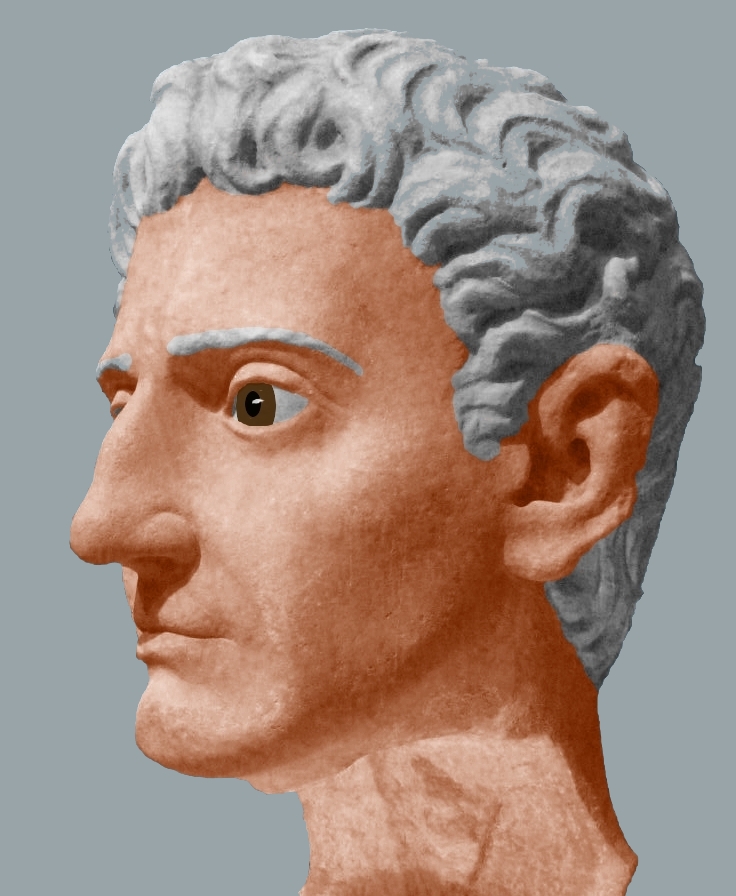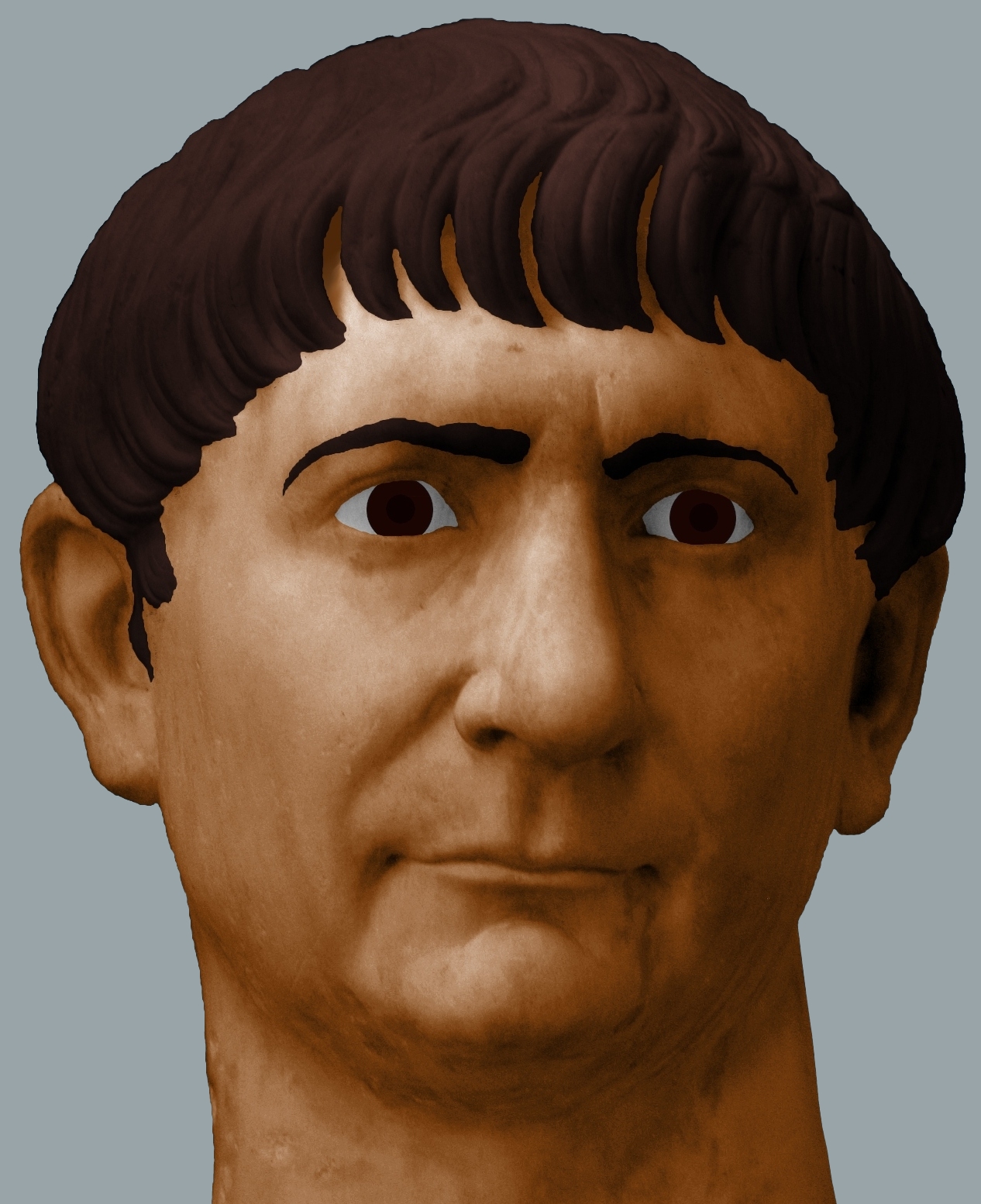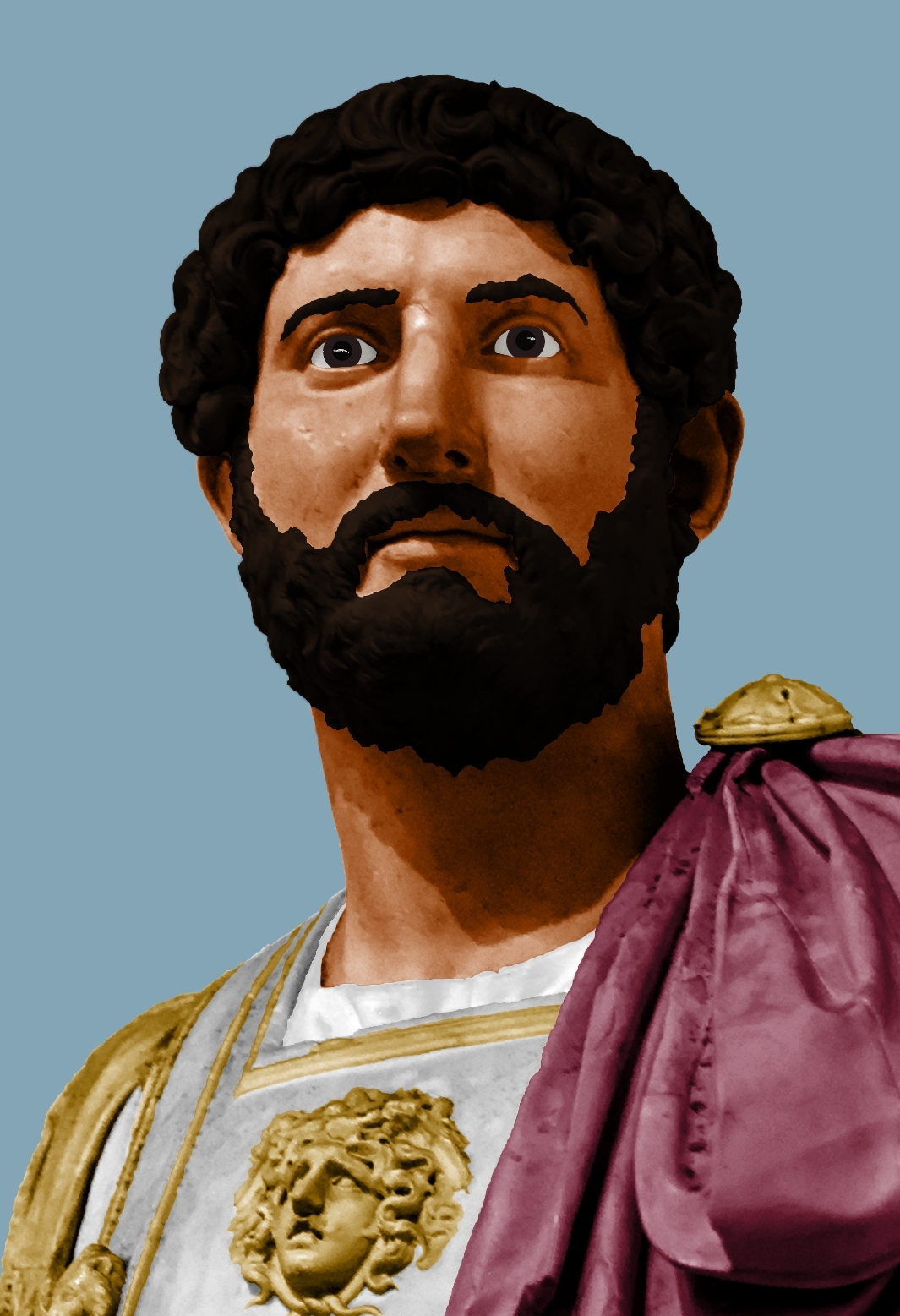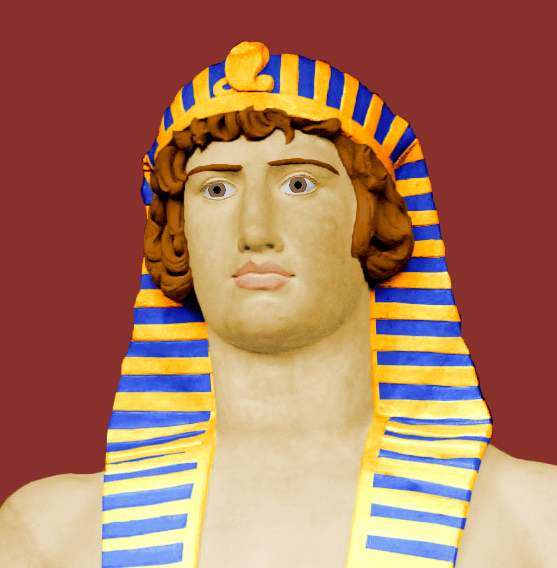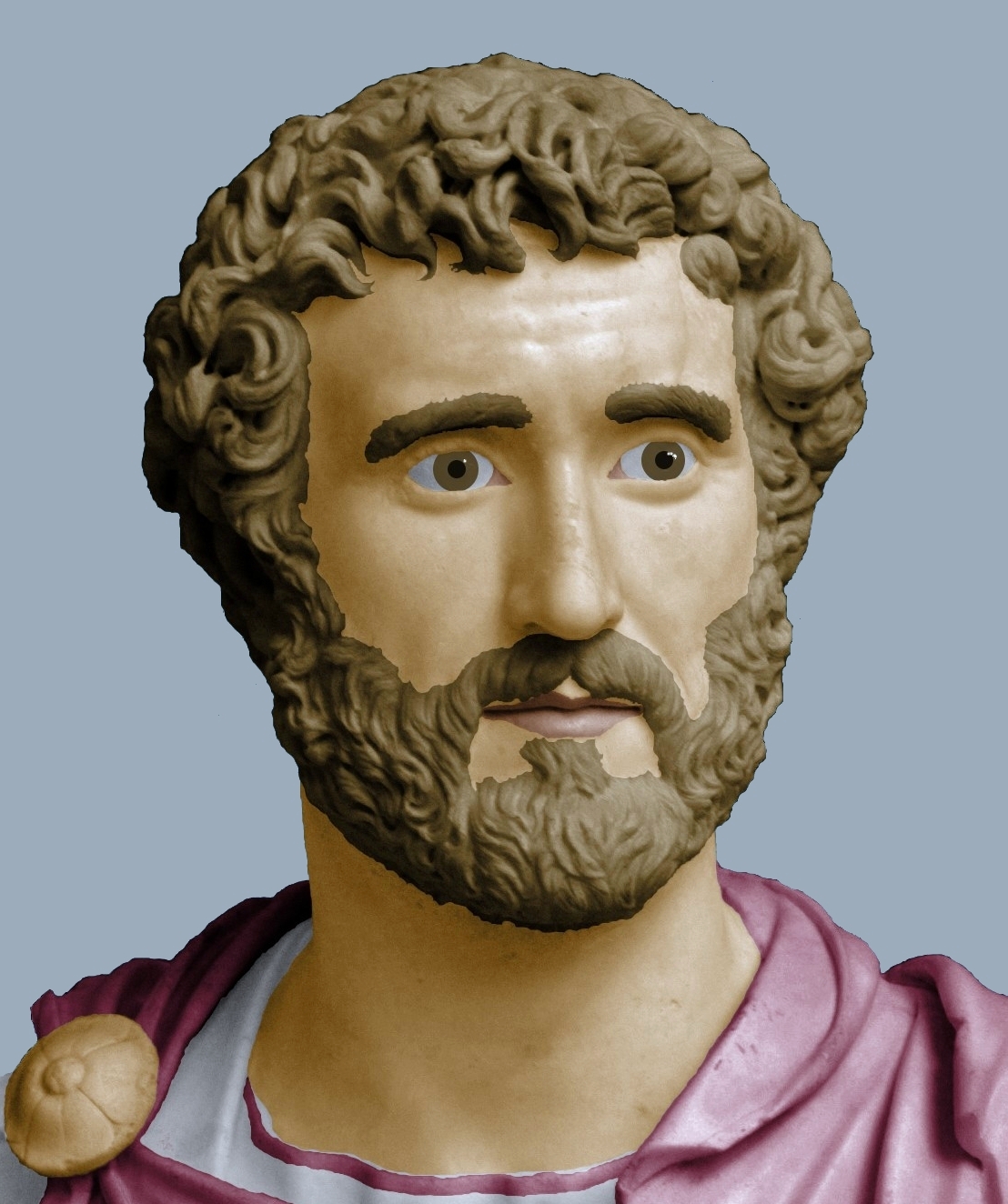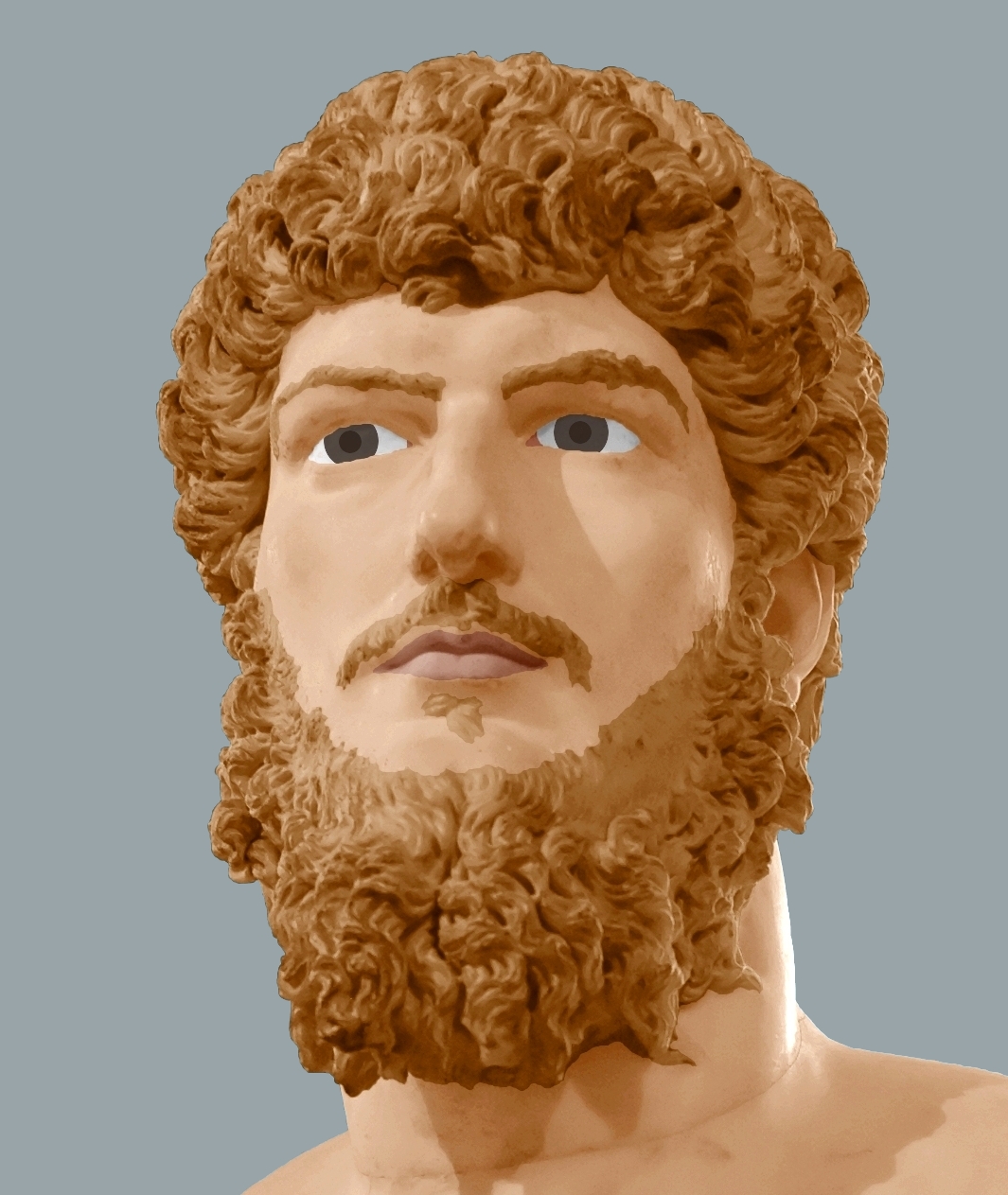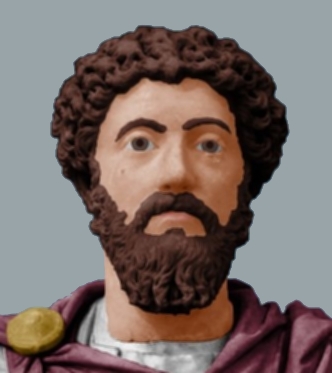ROMAE et AVGVSTO:
to ROME and AUGUSTUS
Rome · Julius · Augustus · Germanicus · Claudius · Britannicus · Vespasian · Titus · Nerva · Divine House · Trajan · Hadrian · Antinoüs · Antoninus · Verus · Marcus · Pertinax · Postumus · Probus · Julian
The Divine Nerva
Principate: 96–98
Nerva was one of those princes who earned posterity’s renown, despite the shortness of his reign (like the divine Titus, Pertinax, and Julian). Nerva presided over the most delicate of transitions. The Flavian dynasty had just come to an end—the first dynastic failure since the civil wars that had followed the extinction of the Julio-Claudian house. It fell to Nerva to play the role of Galba—a childless old man, charged by the Senate to superintend a transfer of power. He exerted himself to play that role better than the foolhardy Galba. Nerva adopted Trajan, a popular military commander who thus became his successor. Showing unexpected forbearance, Nerva swore to put no Senator to death. He recalled those whom Domitian had exiled; before long, he also put an end to the trials against Domitian’s henchmen. His reforms lightened the burden of taxation, split up great landed estates and distributed land to the poor. The Senate, the people, the armed forces, erstwhile partisans and enemies of Domitian—all were as one in their admiration for Nerva. In choosing him as prince, the Senate might have thought they could at most delay the resumption of civil war. Thanks to Nerva’s finesse, civil war would be eliminated for nearly a century.With Nerva, there begins a period of Roman history where the sources are lamentably patchy. We must rely on brief late summaries, such as the histories based on the Kaisergeschichte or the short accounts in Ammianus Marcellinus and Zosimus, or else on the untrustworthy Historia Augusta. Otherwise, we are nearly back in the realm of protohistory for a time.
Birthday: 8 November
The Divine House
Four successive princes—Trajan, Hadrian, Antoninus Pius and Marcus Aurelius—each in turn embody a distinct type of imperial excellence. The conqueror, the builder, the judge, the philosopher: one after the other bestowed the advantages of his own genius upon the State. None can be reproached with any glaring flaw. It is under these four men that Rome reached the zenith of its power, prosperity and prestige. Their relationships with a line of women of great talent—Marciana, Matidia, Sabina, Faustina and the excellent Plotina—bound them together in a single family. To wit, that glorious ‘divine house’ that the Gauls so often honoured in their votive inscriptions.
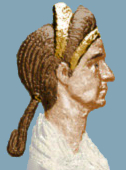
The divine Plotina, Trajan’s wife. She devoted herself to philosophy, being of Epicurean leanings, and became famous for her virtue and good deeds. She favoured the adoption of Hadrian.
(Modification of a photograph by the Classical Numismatic Group, Inc., CC BY-SA)
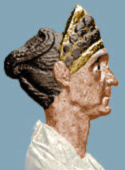
The divine Marciana, sister of Trajan and mother of Matidia. She was Trajan’s constant advisor; on her was bestowed the title of Augusta (with the approval, or even the insistence, of Plotina).
(Modification of a photograph by the Classical Numismatic Group, Inc. in the public domain)
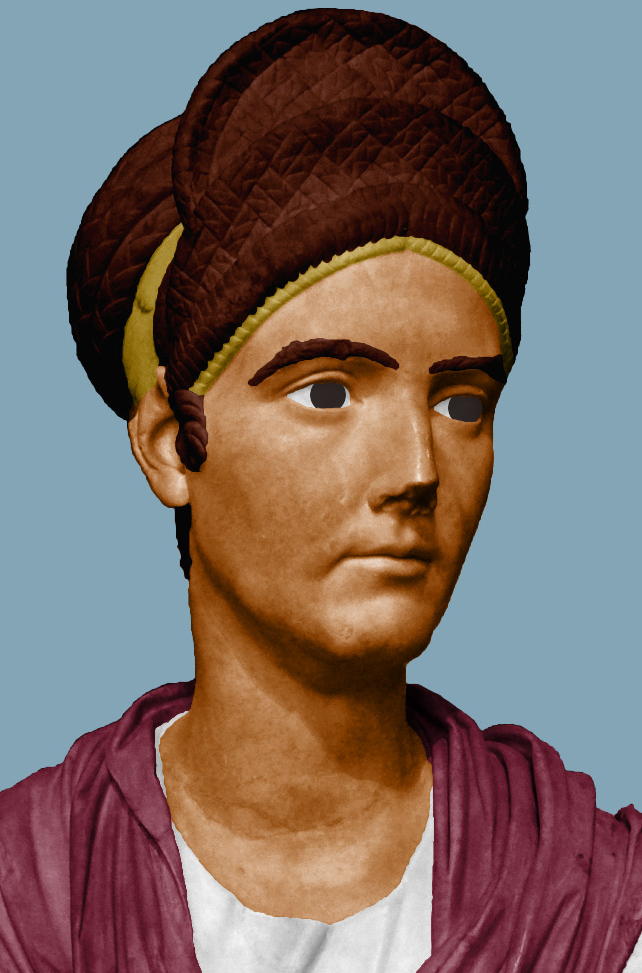
The divine Matidia (bust in the Louvre). She was the niece and confidant of Trajan, and an esteemed cousin of Hadrian, whose mother-in-law she became.
(Modification of a photograph by Clio20, CC BY-SA)
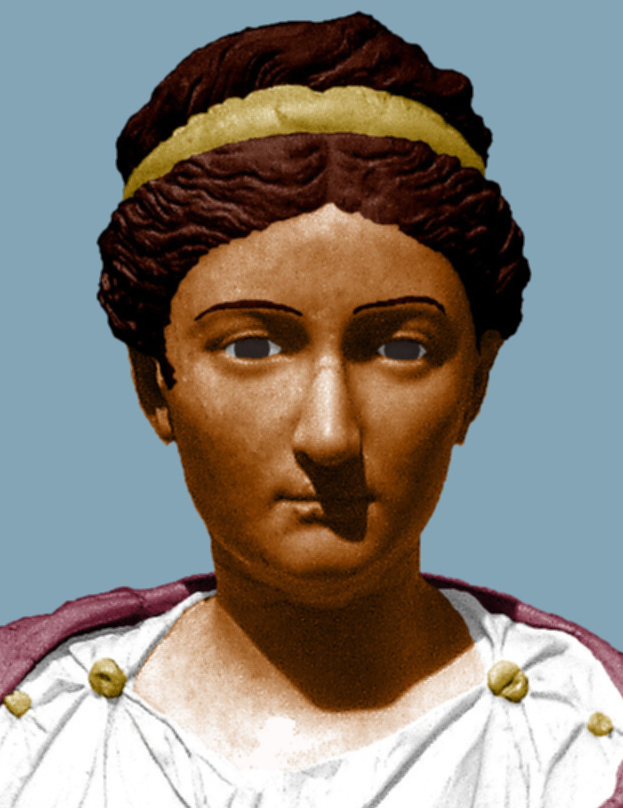
The divine Sabina (bust in the Museo del Prado), daughter of Matidia and wife of Hadrian, noted for her independent and original character.
(Modification of a photograph by Luís García, CC BY-SA)
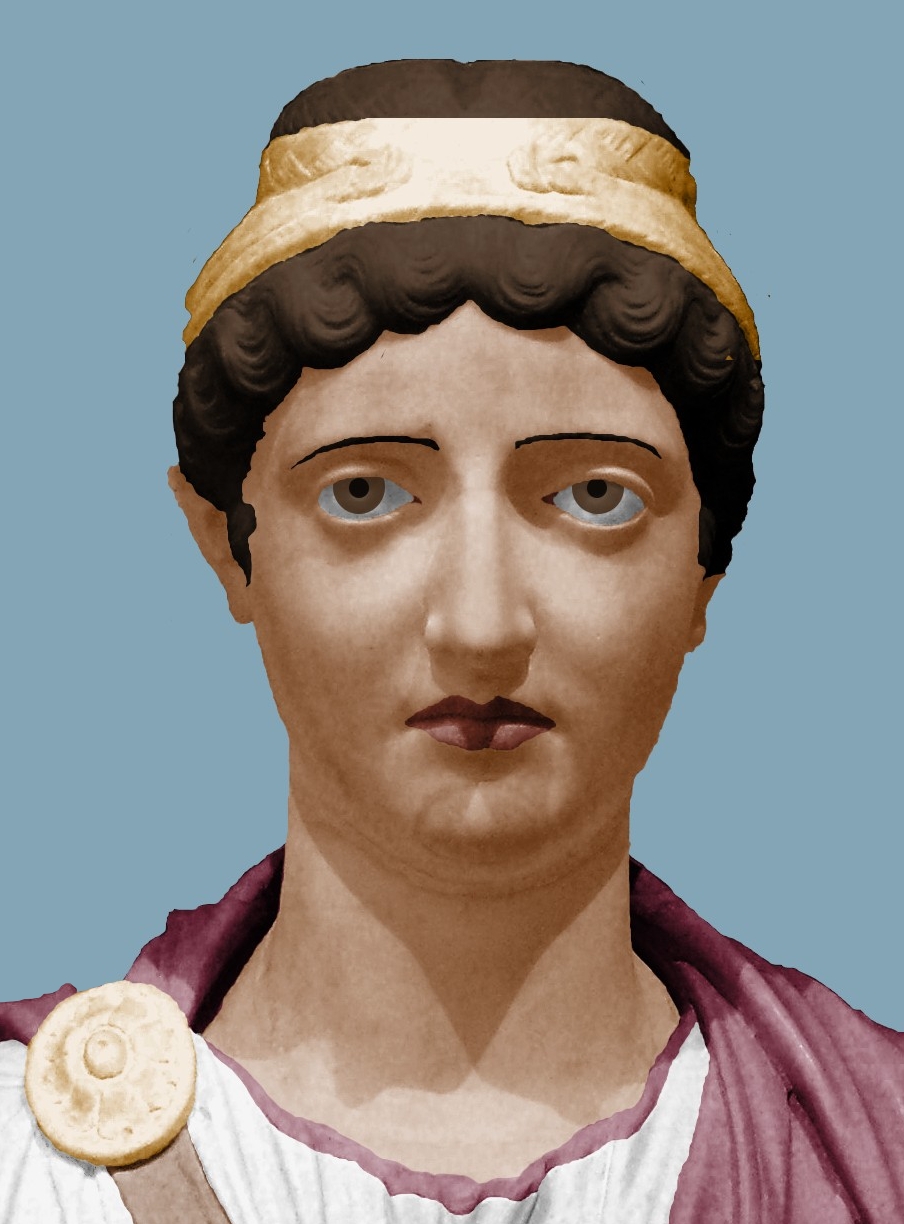
The divine Faustina (the elder; bust in the Kunsthistorisches Museum), granddaughter of Matidia, niece of Sabina and belovèd wife of Antoninus Pius. She was respected for her acts of charity and her frank and virtuous character.
(Modification of a photograph by Gryffindor, CC BY-SA)
The Divine Trajan
Principate: 98–117
A veteran of the army of Germania Superior, the divine Trajan threw himself into the military aggrandizement of the empire, succeeding most notably in the conquest of Dacia (approximately present-day Romania). He carried out still further conquests, including those of Armenia and Mesopotamia, that would not be maintained by his successor Hadrian. Trajan is considered a protégé of Jupiter Optimus Maximus (Best and Greatest), by virtue of which he was given the title of Optimus Princeps (Best of Princes).C. Plinivs Secvndvs Iunior (100 ce), Panegyricus 2. He undertook a major public works project at Rome that produced the forum, baths, market, and column that still bear his name. There were two significant exceptions to the general good order : the great Jewish revolt of the years 115–117 ce and the persecution of Christians in Asia (the first persecution since Nero in 64 ce). Despite these, his principate gives an overall impression of justice, clemency, and prudent administration (Trajan would even be the object of admiration among ancient Christian historians).
“But, in the prince who governs us, what a happy alliance of all good qualities! […] So it was perforce with one whom no civil war had made emperor nor any recourse to violence against the state, but rather peaceful adoption—heaven reconciled with earth at last.” C. Plinivs Secvndvs Iunior (100 ce), Panegyricus 4–5 (French translation). Original version:
At Principi nostro quanta concordia, quantusque concentus omnium laudum omnisque gloriae contigit ! […] Talem esse oportuit, quem non bella civilia nec armis oppressa respublica, sed pax, et adoptio, et tandem exorata terris numina, dedissent.
At the same time, he did not neglect civil administration, which for his time was judicious and prudent. He joined to his own talents those of three illustrious women: his wife Plotina, his sister Marciana, and his niece Matidia. He accepted the advice of each; one or more of them frequently accompanied him in his travels. Before his final illness, he had not made the adoption of Hadrian official; but the latter was to merit all the confidence his adoptive father could have had in him.
Birthday: 18 September
The Divine Hadrian
Principate: 117–138
Wherever you may roam in lands once belonging to Rome, you may discern to this day the works of Hadrian. From the Pantheon in Rome to Hadrian’s Wall, and from the limits of the empire in Germany to the city of Antinoë in Egypt, Hadrian left an indelible mark. He travelled everywhere; he took an interest in everything, contributing new buildings, restorations and improvements. During a visit to Gaul, he had a new aqueduct built in Lugdunum (Lyon) and restored the theatre and amphitheatre whose remains are still visible.
In a manner of speaking, Hadrian is the angel of peaceful development. A lover of poetry and fine arts, but also of mathematics, architecture and logistics, he sought to keep abreast of all that went on under his watch. He was also a tireless hunter, and it was while hunting in Bithynia (today’s northwestern Turkey) that he met his lover Antinoüs.
Hadrian left no son, understandably enough in view of his homosexual preference and troubled marriage with Sabina. He took care all the same to prepare his succession. After one adoptive son (Ælius Cæsar) predeceased him, he adopted another, Cæsar Antoninus, who would earn the sobriquet Pius. Hadrian made Antoninus adopt two sons in his turn, Verus and Marcus Aurelius, who would continue the adoptive Antonine dynasty.
Birthday: 24 January
Antinoüs
Hadrian’s lover was a young man from Bithynia by the name of Antinoüs. Famed for his handsomeness, he became the emperor’s constant companion. In one memorable episode, Hadrian saved his life during a lion hunt. Antinoüs excited controversy by reason of the debauched and Hellenizing influence that he was alleged to exercise over the prince. He was drowned in the Nile during an imperial journey there in the year 130, causing overwhelming grief to the emperor, who built in his memory statues, temples, an obelisk, and even a new city (Antinoöpolis) near the place where he died.
Antinoüs was not divinized by the Senate; he became a god according to Egyptian custom, which held that the same honour awaited any person who drowned in the sacred river. His cult spread across the Empire, syncretizing all along with numerous cults, most notably that of Dionysos–Osiris. Today he is recognized as the ‘queer god’ par excellence.
At Tibur, a devotee of Antinoüs and of the Gallic god Belenus asks:
Antinoo et Beleno par aetas formaque si par,
cur non Antinous sit quoque qui Belenus ?
“So alike are Antinoüs and Belenus in age and handsomeness,
why might Antinoüs not be Belenus himself?”E. Courtney (1995), Musa Lapidaria: A selection of Latin verse inscriptions, The American Philological Association, pp. 152–153, 359–360. Here I use my own translation rather than Courtney’s.
Feast day (Great Antinoeia): 21 April
Birthday: 27 November
Date of apotheosis and foundation of the city of Antinoöpolis: 30 OctoberFor these three dates, I follow the calendar of P. Sufenas Virius Lupus.
The Divine Antoninus
Principate: 138–161
The emperor from Nîmes, Antoninus, called the Pious, oversaw a period of twenty-three years of internal peace, stability and justice. Only a few minor uprisings along the borders (in Great Britain or in Dacia) marred the tranquillity of this exemplary reign. He introduced several legal principles to safeguard justice, including the presumption of innocence and limits on the use of torture. He favoured the manumission of slaves. His style of administration was to oversee the actions of provincial governors and officials from a distance. He therefore gave up the expensive travels of his predecessor Hadrian. Unlike Hadrian, Antoninus had a reputation for chastity; his marriage with Faustina was most harmonious. In the year 148, he held the Secular Games—a festival that the historian Zosimus considers important in upholding the pax deorum (good relations between the gods and mortals of the empire) over the long term.
Birthday: 19 September. By the bye, the temple of the divine Antoninus and Faustina in Rome still stands—it has been converted into the church of San Lorenzo in Miranda.
The Divine Verus
Principate: 161–169 (with the divine Marcus)
The greatest merit of Verus—and it was an unprecedented one—is to have shared the principate peacefully with his adoptive brother Marcus Aurelius. How often must history bemoan those princes who, out of jealousy for their brothers, stain their inheritances with blood! Such was not the case with Lucius Verus. For the first time, the empire had been entrusted to two brothers, and the result was a resounding success. Without machinations, Verus co-operated with Mercus Aurelius, who always enjoyed the privileges of the elder brother. Verus fought against the Persians in Syria and against the Marcomans in what are now Serbia and Banat. Verus had the reputation of being much devoted to gambling and luxury. His mistress Panthea—a beautiful and virtuous Greek—would no doubt have been a good influence on him, but politics required him to marry a daughter of Marcus Aurelius. He died after a nine years’ shared principate.
Birthday: 15 December
The Divine Marcus
Principate: 161–180 (with the divine Verus until 169)
Also known as the divine Marcus Aurelius and the divine Marcus Antontinus, this exceptional emperor dedicated himself to seeking out what constituted the good life. His volume of MeditationsImp. Caes. M. Avrelivs Antoninvs Avgvstvs (années 170), Τὰ εἰς ἑαυτόν, cf. la traduction de J. Barthélémy avec commentaire (1876). bears witness to his long philosophical studies (primarily of the Stoic school, though he was no sectarian). Germanic invasions compelled him to spend much of his reign at war. Marcus Aurelius looked after the security of the borders; he read; he reflected; he tried constantly to improve himself.
The philosophy of Marcus Aurelius (of which we give only a brief sketch here) is grounded in reflection on the proper attitude to take towards concrete events. It offers little in the way of cosmology or metaphysics. Rather, the mind of the individual is at the centre of his thought, and that mind can direct all that concerns one. The phenomena of this world cannot touch one who has the fortitude to face them without fear, without worry, without attachments. Marcus Aurelius’ practice was to mentally fortify himself against death, pain and sadness so that they would lose their sting. To what end? In order to act, virtuously and beneficently, seeking justice with no fear of the consequences. For the only true happiness, according to the Stoics, is to live according to virtue and nature.
It was said that the one injury that Marcus Aurelius ever did to the State was to father a son. It was with that son, the brutish Commodus (little better than the movie Gladiator depicts him), that the golden age of adoptive princes comes to an end.
Birthday: 25 April
Notes
In addition to the sources cited below, I have made use of several secondary sources, particularly Richard D. Weigel’s site De Imperatoribus Romanis and the English and French editions of Wikipedia.

En français svp !

Auf deutsch, bitte!
